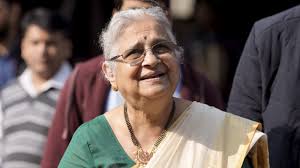Rajya Sabha member Sudha Murty has suggested introducing new training courses and holding examinations for teachers every three years to improve the quality of education. During a discussion on the working of the Ministry of Education on Tuesday, Murty highlighted the critical role of teachers in shaping the education system and stressed the importance of continuous learning and assessment for teachers, especially at the primary level.
Proposal for Regular Teacher Exams
Murty pointed out that once teachers pass their Bachelor of Arts (BA), Master of Arts (MA), or even PhD, they enter the system without any further evaluation until retirement. She argued that this lack of periodic assessment leads to stagnation in teaching methods and knowledge.
“Every three years, they should have a new technique or new knowledge examination. Otherwise, they will not improve,” Murty stated.
She emphasized that even the best school infrastructure and resources would be ineffective without skilled and updated teachers. According to Murty, teaching is an art that requires both qualification and effective methodology in dealing with students.
Training Without Evaluation
Murty noted that while teachers undergo training sessions, there is no formal assessment tied to these sessions. She proposed that teachers should appear for an examination every three years to evaluate their understanding of new teaching techniques and technological advancements.
“If you want to be a good teacher, there is a price for that. The price is not money, but good training and an examination for the teachers,” Murty added.
Support and Criticism from Other Members
Several Rajya Sabha members supported Murty’s suggestion while raising broader concerns about education policy and funding:
- NCP-SCP member Fauzia Khan supported Murty’s call for regular teacher exams and training but criticized the government for reducing education expenditure from 3.8% of GDP in 2015-16 to 2.5% in 2025-26. She also pointed out that there are no clear funds for early childhood education and that three lakh schools remain ungoverned in the country.
- BSP member Ramji called for regulating online education, citing concerns over children accessing age-inappropriate content.
- CPI member Sandosh Kumar P opposed the imposition of Hindi through the National Education Policy (NEP) and called for the protection of all languages. He stated that all Indian languages should be considered national languages.
- JD(U) member Sanjay Kumar Jha argued that language has never been a divisive factor in India, emphasizing the country’s tradition of mutual support.
- CPI(M) member John Brittas criticized the government for benefiting from the constitutional amendment made during the Emergency, which shifted education from the state list to the concurrent list. He suggested reversing the amendment to give states greater control over education.
- DMK member M Thambidurai, BJD member Niranjan Bishi, and BJP member Maharaja Sanajaoba Leishemba also participated in the discussion, offering varying perspectives on education policy and governance.
Challenges in Education Sector
Khan highlighted several gaps in the current education policy and government spending:
- Lack of funding for early childhood education.
- Reduction in budget allocation despite plans for world-class institutions.
- Dependence on state funding for central schemes without adequate financial support.
Kumar P raised concerns over the dominance of Hindi in education and the need to protect regional languages, while Brittas criticized the Centre for branding partially funded schemes as entirely their own.
Conclusion
Sudha Murty’s proposal for conducting teacher exams every three years has received significant support, with several MPs recognizing the need for improved teacher training and evaluation. However, broader issues related to education funding, language policy, and governance remain contentious. The discussion reflects growing calls for systemic reform in India’s education sector to enhance teaching quality and address structural challenges.










